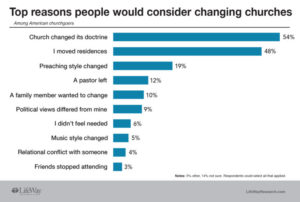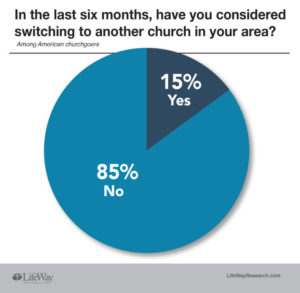The forces driving Americans from churches apparently aren’t limited to the generational and cultural factors that grab headlines these days.
LifeWay Research has found that departures also are likely to occur if a congregation’s core values are altered in some way.
“The study of Protestant churchgoers found most are committed to staying at their church over the long haul,” LifeWay said in an online summary of new research. “But more than half say they would strongly consider leaving if the church’s beliefs changed.”

Scott McConnell, executive director of LifeWay Research, said typical concerns around changes to music and worship likely won’t have the negative impact many pastors worry that they will.
“‘Mess with the music and people may grumble,’” McConnell said. “‘Mess with the theology and they’re out the door.’”
Researchers polled more than 1,000 churchgoers who attend services at least once a month. They asked about the strength of their connections to those congregations.
Among those surveyed, 35 percent have been with their current churches 10 to 24 years, and 27 percent have been with their congregations for a quarter century or more.
Twenty-one percent said they have been with their current churches less than five years, and for 17 percent it was five to nine years, the research group reported.
The study also looked at denominational factors.
Lutherans, Methodists and Baptists – at 52 percent, 40 percent and 31 percent, respectively – were most likely to say they have been with their congregations 25 years or longer.
Nondenominational and Pentecostal Christians were less likely to report such congregational longevity, at 11 percent and 13 percent, respectively.
“‘Most church members have been at their church longer than their pastor,’” McConnell said in the LifeWay Research article.
The survey found a strong commitment to stay put into the future: 57 percent said they are “completely committed” to staying with their congregations, LifeWay Research reported.
Another 28 percent said they are “very much” committed to staying, and 11 percent are “moderately” committed.
“The more people go to church, the more committed they are to attending their same church in the future,” researchers found.
Among weekly attenders, 62 percent have the strongest loyalty. That commitment drops to 31 percent for those who attend twice a month.
Tradition also has an influence, the report said.

“Churchgoers with evangelical beliefs are more likely to be completely committed (67 percent) than those who don’t have evangelical beliefs (45 percent). Baptists (60 percent) are more likely to be completely committed than Lutherans (47 percent).”
But then there are those who are considering leaving.
Altogether, LifeWay Research said, that describes 15 percent of all churchgoers. Of that group, 54 percent have gone as far as to visit another church.
“‘If people are thinking about leaving your church, chances are they’ve already started looking,” McConnell said. “So they’re probably halfway out the door.’”
Reasons for considering a departure vary, but are clearly led by changes in doctrine, at 54 percent. Change of residence was in close second at 48 percent.
Preaching style and a pastor leaving came next at 19 percent and 12 percent, respectively.
Different political views, at 9 percent, and changes in music style, at 5 percent, were among several other, less-common reasons for changing churches, LifeWay Research reported.
